 Petzlover
Petzlover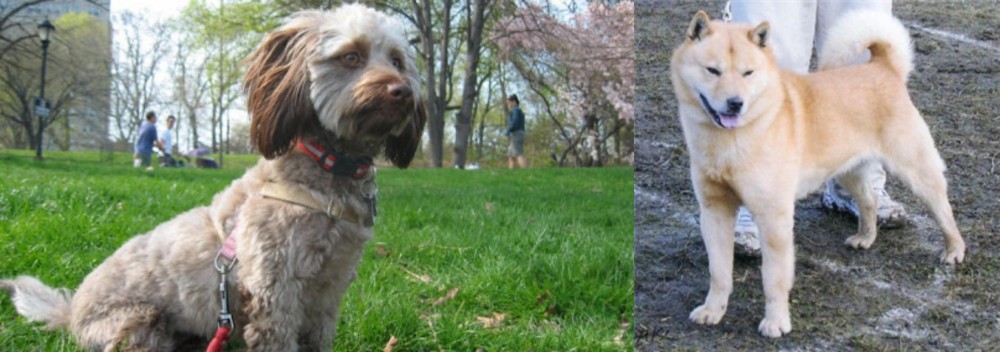 Doxiepoo is originated from United States but Hokkaido is originated from Japan. Doxiepoo may grow 26 cm / 10 inches shorter than Hokkaido. Doxiepoo may weigh 42 kg / 92 pounds lesser than Hokkaido. Both Doxiepoo and Hokkaido has same life span. Both Doxiepoo and Hokkaido has almost same litter size. Both Doxiepoo and Hokkaido requires Moderate Maintenance.
Doxiepoo is originated from United States but Hokkaido is originated from Japan. Doxiepoo may grow 26 cm / 10 inches shorter than Hokkaido. Doxiepoo may weigh 42 kg / 92 pounds lesser than Hokkaido. Both Doxiepoo and Hokkaido has same life span. Both Doxiepoo and Hokkaido has almost same litter size. Both Doxiepoo and Hokkaido requires Moderate Maintenance.
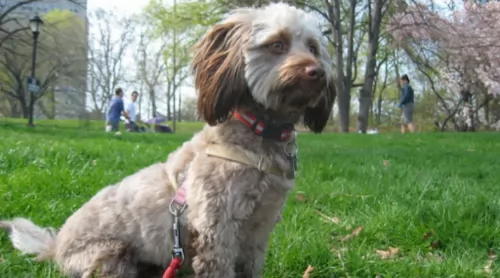 The Doxiepoo is a designer dog breed - a combination of the Dachshund who was used to hunt for Badgers and the Poodle, a dog bred in France to essentially be a lap dog. There is however some dispute as to whether the Poodle descends from Germany or from the French Barbet.
The Doxiepoo is a designer dog breed - a combination of the Dachshund who was used to hunt for Badgers and the Poodle, a dog bred in France to essentially be a lap dog. There is however some dispute as to whether the Poodle descends from Germany or from the French Barbet.
Wherever the parents hail from, the Doxiepoo hails from the United States of America.
With both the Poodle and the Dachshund being intelligent, fun and loving type of canines, the two of them together have brought out a wonderful hybrid pet in the Doxiepoo. Today, the Doxiepoo is bred with other Doxiepoos.
 The Hokkaido breed originates in Japan and is also called Ainu-ken, Ainu dog, Seta or Do-ken. The last being its common name in Japan. It is believed that the Hokkaido is descendent from the Japanese Matagi-ken, meaning hunting dog, deer hunting dog or bear hunting dog. It was the Ainu peoples that brought the breed to Tohoku. Many years later the Yayoi people brought in another breed of hunting dogs. These breeds were in isolation for most of their existence and therefore they had little influence on the further development of other breeds.
The Hokkaido breed originates in Japan and is also called Ainu-ken, Ainu dog, Seta or Do-ken. The last being its common name in Japan. It is believed that the Hokkaido is descendent from the Japanese Matagi-ken, meaning hunting dog, deer hunting dog or bear hunting dog. It was the Ainu peoples that brought the breed to Tohoku. Many years later the Yayoi people brought in another breed of hunting dogs. These breeds were in isolation for most of their existence and therefore they had little influence on the further development of other breeds.
The Ainu dog was used in searches as well as hunting and became in 1937 “a rare species in Japan that is protected by law”. At that time the Official Name of the breed was set in place as Hokkaido-Inu. But they are still called Hokkaid0-Ken by most Japanese people.
This is a very rare breed of dog. It is hardly known outside of Japan and in country there are about ten to twelve thousand remaining. Of those about nine hundred to one thousand are registered in Japan every year. It is guessed that less than thirty exist outside Japan.
The Hokkaido breed is the oldest Japanese breed of dogs. Today they are great indoor companions, loyal and friendly. Most people in Japan still call them the Ainu dog.
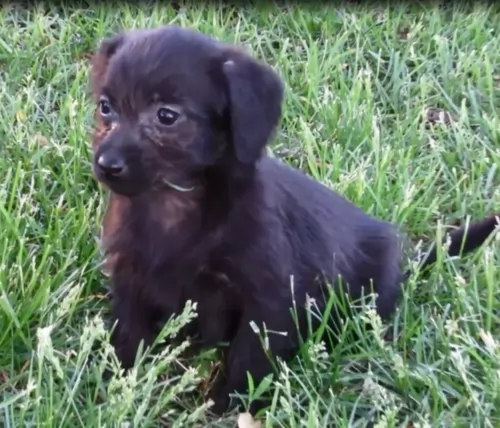 The Doxiepoo can range from being a small to medium sized dog, standing at anything between 20cm to 25cm in size and weighing between 3kg and 7kg, depending much on whether a standard, miniature or toy sized poodle was used in the breeding.
The Doxiepoo can range from being a small to medium sized dog, standing at anything between 20cm to 25cm in size and weighing between 3kg and 7kg, depending much on whether a standard, miniature or toy sized poodle was used in the breeding.
The Doxiepoo could look like either one of the two breeds, but he will have a strong, sturdy body with a curly or wavy coat of varying lengths and various colors - cream, black, tan, apricot, grey or white. The poodle side of him ensures he is a hypoallergenic dog.
Between the Dachshund and the Poodle, you’re going to get a wonderful array of characteristics as they both come with their strong points. Certainly you will be well entertained and amused by your pet, while he can also be useful as a watchdog.
Being a small dog, he will fit well into life in the city or in the countryside. He is as bright as a button and learns tricks and new skills quickly. With training and socialization he becomes obedient and well behaved wherever he is, getting on well with other pets in the home as well as with all children and adults.
The Doxiepoo is a lively, alert, energetic dog and will require being exercised – lots of ball games and a walk will keep him lean, muscular and content.
 The Hokkaido breed is medium in size but very strong in build. Dogs bred outside Japan tend to be smaller. They have wide, deep chests, and long thick coats compared with Japanese dogs from other breeds. It is a double coat of long fur on top and short softer fur underneath for the second coat. Their ears are triangular and small while their eyes have a triangle outline. The double coat could be sesame, white, red, black, black and tan and wolf-gray.
The Hokkaido breed is medium in size but very strong in build. Dogs bred outside Japan tend to be smaller. They have wide, deep chests, and long thick coats compared with Japanese dogs from other breeds. It is a double coat of long fur on top and short softer fur underneath for the second coat. Their ears are triangular and small while their eyes have a triangle outline. The double coat could be sesame, white, red, black, black and tan and wolf-gray.
They are an intelligent breed with an impulsive gait. They are alert, courageous and suspicious. They were used for guarding the city gates. Their skull is flat and broad and the tongue, like the chow chow, is blueish. black. With a black nose and a wedge shaped muzzle, the Hokkaido is a handsome dog. His lips are with black and tight. High set, thick tail over the back or slightly curved to the side.
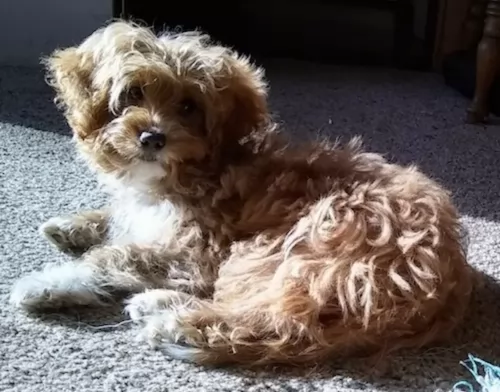 Every dog, even the little ones like this, will require some kind of input from you if you want to get the best from him. Every puppy bought as a gift when they’re cute and cuddly turns into an adult, and often the very person who received him as a gift, loses interest and neglects him. Then they wonder why the dog becomes irritating and destructive.
Every dog, even the little ones like this, will require some kind of input from you if you want to get the best from him. Every puppy bought as a gift when they’re cute and cuddly turns into an adult, and often the very person who received him as a gift, loses interest and neglects him. Then they wonder why the dog becomes irritating and destructive.
A dog is a long term investment and if you commit to your sweet Doxiepoo, you’ll get years and years of devoted friendship.
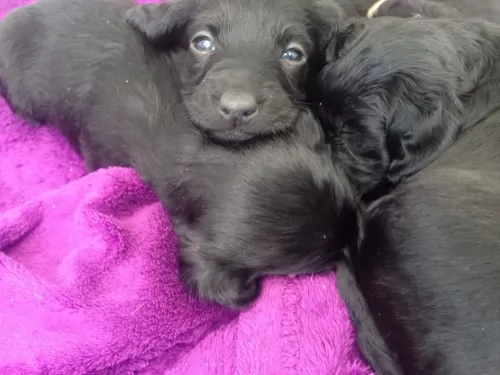 The life expectancy of the Doxiepoo is around 12-15 years of age if he is well looked after. He is a robust dog, but he can still face some health issues that both his parents contend with.
The life expectancy of the Doxiepoo is around 12-15 years of age if he is well looked after. He is a robust dog, but he can still face some health issues that both his parents contend with.
Just some of the diseases that the Doxiepoo might face while in your care are ear- and skin infections, dental disease, digestive tract problems, heart conditions and epilepsy. If you think your pet has any kind of illness, it is imperative to get him to the vet for a checkup.
Poodles, particularly are prone to skin disorders. They can be allergic to grass, parasites and food. If your Doxiepoo chews or licks his paws or some other area a lot, and the skin is red, he could have a skin allergy.
The vet will be able to diagnose your dog’s allergies with some skin- or blood testing. For instance, sebaceous adenitis is an inherited allergy that affects the lubrication of the skin and hair follicles. Symptoms of the disease include scaly skin, sore and even hair loss.
 Often breeds that are isolated like the Hokkaido, have a pretty good health history but there are a few serious issues that they face.
Often breeds that are isolated like the Hokkaido, have a pretty good health history but there are a few serious issues that they face.
1/3 of all dogs have it while 2/3 are carriers. This disease is congenital and there is no cure. It affects the sclera, retina and choroid. It can be mild or it can cause blindness.
Affecting joints and cause arthritis and lameness.
Floating kneecap – not as prevalent here as in smaller dogs.
Could be mild or serious. Could require a pacemaker.
Seizures of an unknown origin. Can be treated with medication not cured.
Excessive, uncontrollable urge to drink large amounts of fluid without a stimuli.
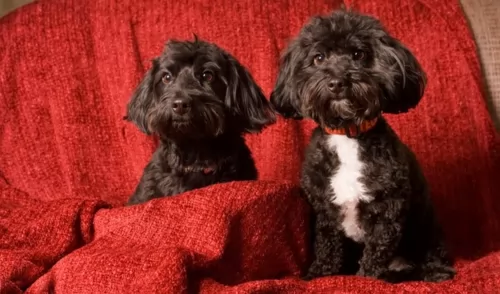 You can’t be sure what kind of coat your Doxiepoo will have but he will certainly require brushing at least twice a week. In some instances it may be wise to seek out the services of a professional groomer who does an excellent job of trimming the hair, cleaning the teeth, checking the ears and clipping the nails.
You can’t be sure what kind of coat your Doxiepoo will have but he will certainly require brushing at least twice a week. In some instances it may be wise to seek out the services of a professional groomer who does an excellent job of trimming the hair, cleaning the teeth, checking the ears and clipping the nails.
The Doxiepoo, just like any other dog, will need to be trained and socialized early as he is a stubborn dog and will need to be trained to be obedient. With this training and socialization, he becomes amicable around children and pets in the home. He learns easily too and this is what makes him a great pet for first time dog owners.
The Doxiepoo is a moderate energy dog, so he will do well on a walk every day. You can also make use of ropes, balls and frisbees to give him a bit of a workout in the garden.
He loves water too and will enjoy a run on the beach and cooling off in the ocean. He adapts easily to life in the city or in the country, so long as he is with his human companions.
The Doxiepoo will eat dry kibble, particularly if it is from the highest quality brands and chosen according to the dog’s size, age and activity levels.
Now and then you can add in a little bit of cooked rice, vegetables and chicken for variety. Some raw meat can play an important role in keeping the skin healthy and free from dryness and itchiness. Make sure that he always has fresh, cool water available to him.
 The puppy needs about 300 -400 calories per day in 3-4 servings per day
The puppy needs about 300 -400 calories per day in 3-4 servings per day
The adult dog needs about 250-350 calories a day to maintain good weight and health. Feed 2-3 times per day.
Strong, stamina
These dogs love exercise and definitely need it. They will get to be anxious or bored if they don’t get enough exercise. A back yard run is fine but remember that the Hokkaido is a jumper and make sure your fence is at least six feet high. They need daily walks even if you have a fenced yard. Martindale collars or harnesses are needed when walking them.
These dogs love games and competitive activities. They are good at hunting and guarding of course. There are other activities they can excel at and enjoy jogging, biking with you, and hiking. In competition they enjoy and are good at agility, flyball, lure coursing, rally, weight pull, dock diving, and obedience. They do not participate in confirmation.